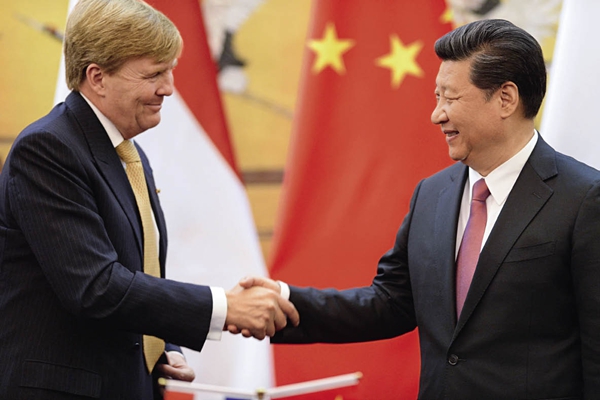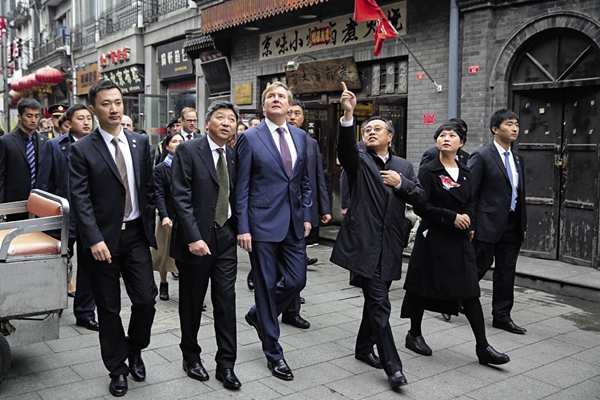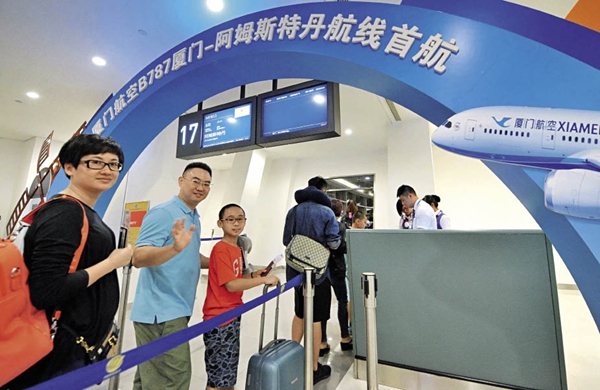Chinese Growth, A Boon for the Dutch Economy
By staff reporter LIU CHENGZI
CHINA’S economic growth has provided business opportunities for the Netherlands,” said André Driessen, deputy head of mission at the Royal Netherlands Embassy to China. He added that China and the Netherlands were jointly building an extensive cooperation partnership and that much headway had been made in sectors such as politics, economy, culture, education, environmental protection, and health care.
Deepening China-Netherlands Relations
In recent years, China and the Netherlands have seen frequent political and economic exchanges.
In March 2014, Chinese President Xi Jinping and his wife Peng Liyuan visited the Netherlands. In October 2015, King Willem-Alexander and Queen Máxima of the Netherlands paid a state visit to China following Dutch Prime Minister Mark Rutte’s visit in March the same year. At his meeting with the Dutch King, Xi Jinping said that China and the Netherlands had achieved all-round interconnectivity, which offered a unique advantage for strengthening the Belt and Road cooperation. King Willem-Alexander emphasized that the Belt and Road Initiative was a great opportunity that was well worth the cooperation of the whole world with China.

President Obama has voiced support for China’s hosting of the G20 Summit, thus sending a positive message as regards stimulating sustainable global economic growth to the international community.
Driessen commented that the frequent interaction between the high-level leaders of China and the Netherlands and their explicit attitudes manifested that the two sides attach great importance to their strategic partnership. He also noted that last year, King Willem-Alexander not only led government officials but also a trade delegation that covered sectors such as agriculture, food, life science, and health to China. Both state leaders witnessed the signing of 15 memorandums and cooperation agreements.
The bilateral exchanges between China and the Netherlands in fields such as the economy, trade, and culture have maintained good momentum and increasingly deepened. In terms of economy and trade, the Netherlands has been China’s second largest trade partner in the EU for 12 consecutive years since 2003. China is currently the largest trade partner of the Netherlands outside the EU and its second biggest source of investment. In terms of people-to-people and cultural exchanges, more and more cultural projects have been delivered, and the number of Chinese tourists to the Netherlands has been on the rise. In 2015, Chinese holidaymakers booked 436,000 nights in Dutch hotels, a rise of 33 percent over 2014. According to Driessen, the Netherlands plans to provide more convenient visa services to Chinese tourists by expanding the current four visa application centers in Beijing, Shanghai, Guangzhou, and Chongqing to 11 around the country. KLM Royal Dutch Airlines and its cooperative partners now run 40 to 50 flights weekly between Amsterdam and eight Chinese cities.

King Willem-Alexander of the Netherlands visits Dashilan historical and cultural district near Tian’anmen Square in Beijing on October 26, 2015.
“The state visit of the Dutch King and Queen to China last year was the highlight of our bilateral relations,” said Driessen. “This year Dutch diplomatic organs in China are willing to deepen the open and pragmatic cooperation between China and the Netherlands,” he added.
Netherlands Welcomes Foreign Investment
“Cooperation with the Netherlands means you have one of the most solid partners in the EU. The financial crisis has obviously exerted considerable impact on the EU countries; however, thanks to its steady economic foundation, the Netherlands has been one of the best performers among all the EU economies,” Driessen said. “The Chinese economy is fueled by great internal potential, yet faces many crises, so it needs to enhance cooperation with countries around the world,” he added.
Statistics show that the Dutch economy, boosted by rebounding investment and domestic demand, witnessed a strong revival in 2015, with its GDP growing by 1.9 percent. Chris Teunissen, executive director for China of the Netherlands Foreign Investment Agency (NFIA) and consul for industrial affairs of the Netherlands Consulate-General in Shanghai, quoting the data from the World Economic Forum’s Global Competitiveness Report, said the Netherlands had climbed from eighth to fifth place in terms of global competitiveness – the best performance it has ever achieved. That signifies the Netherlands is still one of the most advantageous and most creative economies in the world.
Driessen pointed out that the Netherlands’ moderate growth, updated macroeconomic indicators, stable economic environment, relatively low operational costs, and strong competitiveness in terms of commercial environment and innovation ability forecast a promising future and great opportunities for enterprises that intend to explore the European market by taking the Netherlands as a gateway. “All the aforementioned factors will bring confidence to Chinese investors,” Driessen said.
Chinese Enterprises in the Netherlands
According to the latest data from the NFIA, 30-odd Chinese enterprises invested in the Netherlands in 2015, seven of which have operated in the Dutch market for many years, with the total investment exceeding €50 million. The Chinese enterprises invested and launched operations in the Netherlands by establishing headquarters, production bases, and logistics and distribution centers, among other means.

Passengers prepare to board the Xiamen Airlines MF811 flight from Xiamen to Amsterdam on July, 26, 2015.
In 2015, the Chinese company Hikvision Digital Technology set up its European headquarters in the Netherlands. Huawei, a leading global information and communication technology solutions provider, established a logistics center in Eindhoven. The Dajiang Innovations Science and Technology Co., Ltd. and Head Aerospace Technology Co. set up sub-companies respectively in the Netherlands. China Construction Bank opened a branch in Amsterdam. And Xiamen Airlines launched a Xiamen-Amsterdam route. Happy Fish, a famous Chinese game developer, and Jilin Zixin Pharmaceutical Co., Ltd., a pharmaceutical company for traditional Chinese medicine, have both established R & D centers in the Netherlands.
By the end of 2015, Chinese companies had set up a total of 550-odd operating agencies in the Netherlands. In 2016, Chinese enterprises continue to expand their investment in the Netherlands: the Industrial and Commercial Bank of China established its Rotterdam branch, which is its second business institution in the country following the Amsterdam branch; China Eastern Airlines launched a flight from Shanghai’s Pudong to Amsterdam’s Schiphol as of June 26; Yantai Jereh Petroleum Equipment & Technologies Co., Ltd, an international energy company that specializes in oil and gas services, established its subsidiary company in The Hague to take care of its business in Europe; and Beijing Hainachuan Automotive Parts Co., Ltd (BHAP), which bought Inalfa Roof Systems in 2011, opened new headquarters in Limburg in the Netherlands.
Chris Teunissen said that China had been the second largest source of investment for the Netherlands. The NFIA will work closely with its 11 partner investment development agencies operating under an “Invest in Holland” network to assist Chinese businesses looking to invest in the Netherlands. He is confident that Chinese enterprises will also achieve success and growth in the process.
- Making the Food Safety City Brand Construction a Focus - The Seventh Weihai International Food Expo opens
- Expand Trade and Upgrade FTA – An Exclusive Interview with New Zealand's Ambassador to China
- China & CEE Countries Alight Fast Track of Cooperation
- China Strengthens Links with Central and Eastern Europe
- Iron and Steel Industry in Transformation
Services
Economy
- Making the Food Safety City Brand Construction a Focus - The Seventh Weihai International Food Expo opens
- Expand Trade and Upgrade FTA – An Exclusive Interview with New Zealand's Ambassador to China
- China & CEE Countries Alight Fast Track of Cooperation
- China Strengthens Links with Central and Eastern Europe
- Iron and Steel Industry in Transformation
